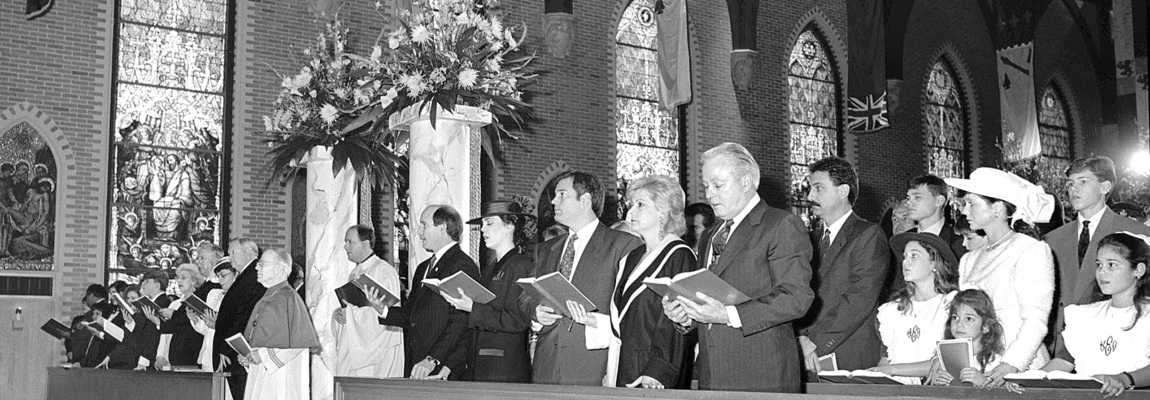
A platform that encourages healthy conversation, spiritual support, growth and fellowship

NOLACatholic Parenting Podcast
A natural progression of our weekly column in the Clarion Herald and blog

The best in Catholic news and inspiration - wherever you are!
Former Gov. Edwin Edwards: Charismatic but flawed
-

By Peter Finney Jr.
Clarion Herald
This was well before “Vote for the Crook. It’s Important.”My sister Barbara was a student at St. Mary’s Dominican High School in the early 1970s when she and some of her classmates on the student council traveled to Washington, D.C., to see how government really worked.
Right.
One of the teenage girls’ guest speakers during their tour of the Capitol was a swashbuckling, debonair Congressman from Avoyelles Parish, Edwin W. Edwards, whose charm oozed from every pore. If Edwards’ silver tongue could melt the hearts of meter maids, imagine what he could do to a bunch of girls in plaid skirts and saddle oxfords.
When she returned home from her trip, my sister announced to the family: “I just met the next president of the United States.”
Edwards, who died July 12 at his home in Gonzales a month shy of his 94th birthday, probably could have been president if he actually had put all four lobes of his brain to the worthy project, but, in the end, he had too much fun serving as governor of Louisiana for four terms and certainly wasn’t interested in a White House job that paid, by his standards, less than the minimum wage.
For all his Cajun charisma and good cheer – Edwards once famously brought down the house by describing Republican rival David Treen as being “so slow it takes him an hour and a half to watch ‘60 Minutes’” – Edwards was beset by personal failures that tarnished his political legacy and burnished the state’s reputation as the zydeco coaster of governmental corruption.
He served eight years in federal prison – he proclaimed himself “a model prisoner” – for a racketeering conviction in which he wheasled a $400,000 bribe from former San Francisco 49ers owner Eddie DeBartolo for help in obtaining a riverboat casino license from the state.
When the multi-millionaire DiBartolo pleaded guilty to not reporting the extortion, Edwards said: ''If I had victimized him, I would have done it for a lot more than $400,000.”
While Edwards was the ultimate horse-trading politician, Kirby Ducote, one of the Archdiocese of New Orleans’ two main lobbyists during his tenure, said the governor’s dealings with the Catholic Church were always amiable and above board.
Ducote worked with former Clarion Herald editor Emile Comar as head of a nonprofit group called Citizens for Educational Freedom (CEF), which advocated for public support for parochial and private schools based on the argument that those schools greatly relieved an educational burden on the state.
“We were involved with him when he ran for governor for the first time in 1972, and he was very receptive to what CEF was talking about,” Ducote, 90, recalled.
Edwards even agreed to then-Archbishop Philip Hannan’s request to have a regular lunch with the state’s Catholic’s bishops – usually right before the upcoming legislative session – to discuss issues that might impact the ministry of the church, such as education and social work through Catholic Charities.
“Hannan would do the talking, and Edwards would say what he could do and what he couldn’t do or what he wouldn’t do,” Ducote said. “So we knew pretty much prior to the session if we would have someone opposing it – namely, the governor. It worked out fine. The governor and the archbishop got along very well.
“Edwards could charm anyone. But when he told you something, you could pretty much take it to the bank and believe it.”
The moment of truth for church-state relations came in November 1991, when the choice for governor amazingly came down to Edwards or former Ku Klux Klan Grand Wizard David Duke. Duke placed his campaign signs 20 feet up on telephone polls so that they would not be easily removed.
The biggest billboards, however, came from those pushing the lesser of two evils: “Vote For the Crook. It’s Important.”
“My feeling was that Edwards was going to eat Duke alive,” Ducote said. “There was no chance that I thought David Duke would win. Edwards won in a landslide.”
In 1978, the National Catholic Educational Association gave Edwards the Presidential Award for his strong support of Catholic education in Louisiana during his first two terms as governor. Edwards had been strongly supportive of state funding for textbooks, school supplies, bus transportation and continuing education.
Ducote said there were few politicians in his 50 years dealing with state lawmakers who had Edwards’ clout, bravado and communication skills.
“He came from Avoyelles Parish, and those people up there know how to talk,” Ducote said, laughing. “They get along with people, and that’s the way he was. Edwin Edwards was the most interesting politician I ever met.”




